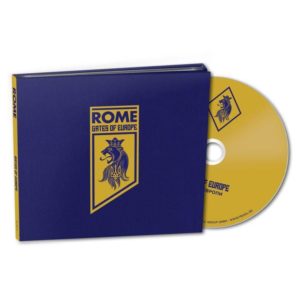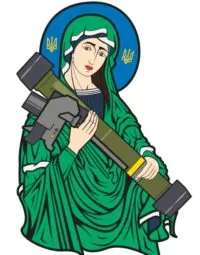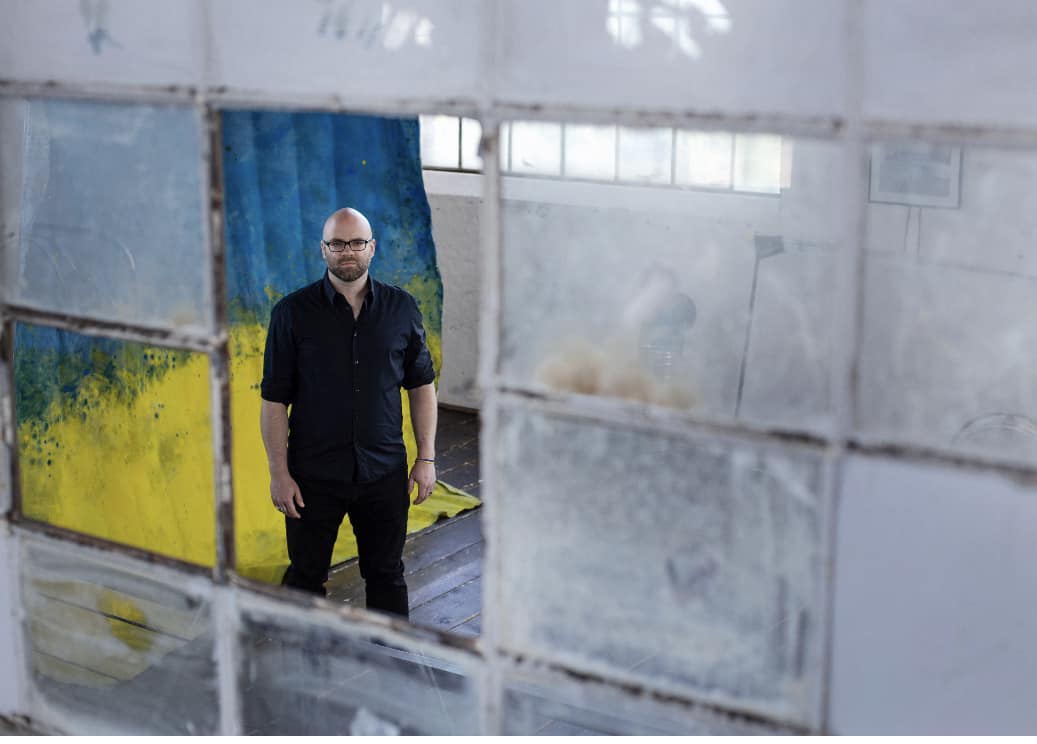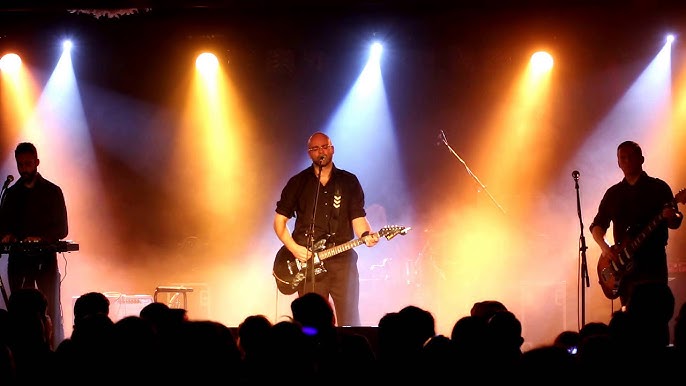Rome, a Luxembourgish neofolk music band centered around the talents of Jerome Reuter, stands out as possibly the sole European musical group that performed in Ukraine during the war—more than once.
With historical themes at the forefront, Rome has previously adeptly crafted songs that explore Europe's past and present, notably criticizing 20th-century fascism and its repressive aspects. Now, this quirky neofolk band slams the neofascists of the 21st century. Rome has unveiled an album, "Gates of Europe," entirely dedicated to Ukraine's resistance. The freshly released album, named after the book "Gates of Europe" by the renowned Ukrainian-American historian and Harvard professor Serhiy Plokhiy, offers an artistic response to the events unfolding in Ukraine amid Russia's full-scale invasion.
 Gates of Europe encompasses songs dedicated to specific events and places—such as "Olenivka Rain," "The Ballad of Mariupol," and "Going Back to Kyiv"—as well as those capturing the spirit of Ukrainian resistance against Russian aggression, including "Yellow and Blue," "The Black Axis," "How Beauty Emerged Against this Darkness," and "Eagles of the Trident."
Gates of Europe encompasses songs dedicated to specific events and places—such as "Olenivka Rain," "The Ballad of Mariupol," and "Going Back to Kyiv"—as well as those capturing the spirit of Ukrainian resistance against Russian aggression, including "Yellow and Blue," "The Black Axis," "How Beauty Emerged Against this Darkness," and "Eagles of the Trident."
Notably, the "topographical" songs were also featured in the mini-album, "Defiance," released last year and dedicated to Ukrainian themes.
Ukraine, the Gates of Europe of the last millennia, and their meaning for Russia – Serhii Plokhii explains
Jerome Reuter is profoundly familiar with symbols and allusions that have persisted throughout the war. A standout song, "Yellow and Blue," incorporates a famous quote from Ukraine's President Volodymyr Zelenskyy, "I need ammo, not a ride," but repeats these words to speak as if on behalf of all Ukrainians. This quote is artfully woven into an uplifting song incorporating the early slogan of Ukraine's resistance: "Courage comes in two colors: Yellow and Blue."
"We don't want no pity, no. No signed petition.
We don't want a ride. We just need ammunition.
We don't run on dollars. The green won't do.
For strength has two colors—Yellow and Blue.
We don't run on dollars. The green won't do.
Courage has two colors. Yellow and blue."
(Yellow and Blue)

The track "Lady of the Legion" references the iconic image of St.Javelin's Lady with a Javelin, emphasizing the necessity of resistance to restore peace. The song itself contemplates European subjects, opening with the question, "Where does Europa end?"
The refrain that proclaims: "Solely through the most brutal fight" (reiterated in German) resounds in the song "Eagles of the Trident." This song resonates as one of the most spirited and forceful on the album, encapsulating the energy of the battle.
"Who won't fear the serpent's glide,
And who is left to trust,
And follow with a fearless heart tonight,
To bear what brave men must."
(Eagles of the Trident)

However, many songs on the album veer toward the lyrical and melancholic, unexpectedly poignant. The song "Marauder,'" serves as an astute commentary on the deeds and fate of the Russians. Carrying a tense and introspective sound, it narrates the destiny of a traitor.
"Hide in the wind, hide in the reeds, and in the rain,
Hide to fight until they crawl home again.
Hide in the wheat, hide in the reeds, and in the rain,
Hide to fight until they crawl home again."
(Marauder)
Another melancholic and deeply profound song is characterized by the refrain, "Whom the Gods wish to destroy, they first make mad." In this piercing manner, the song alludes to the Russians. It also extols Europe and emphasizes that Ukrainians will "never kiss the hands of the moskali."
"Moskali" is ethnic slur (formerly neutral term) that means "Russian," literally "Muscovite." "Moscovia" was the name used for the state centered in Moscow before it appropriated the title "Kyiv Rus," originally centered in Kyiv. Interestingly, there has been a petition to refer to Russia as "Moscovia" in Ukrainian, delegated by Ukrainian President Zelenskyy for review by the prime minister.
The song carries further historical allusions, underscoring that Europe's "walls have never been reached," likely referring to historical instances where Ukraine thwarted Eastern invasions.
Overall, Europe holds a significant place in the album, being described as "a mother to us all" in another evocative, piercing song, "How Came Beauty Against This Blackness?"

"Viva Uropia, we'll see peace, with our brows bound with victory's wreaths.
Viva Uropia, and leave us be, we'll never kiss the hands of the Moskali.
For those whom the Gods wish to destroy, they first make mad.
Those whom the Gods wish to destroy, they first make mad.
Viva Europa, you'll hear us chant,
On this dreadful march to the joyful dance.
Viva Europa, your walls have never been reached."
(Whom the Gods wish to destroy)
The menace emanating from Russian aggression, sung with a touch of anger and condemnation, also reverberates in the song "Lady of the Legion," concurrently highlighting Ukrainian resilience and determination, "holding the fort" and "crying no more"—alluding that Ukrainians have previously experienced such brutality and aggression at the hands of the Moscovites.
Trending Now
"All they offer is death, only death. It's all they've ever done.
And until our last breath, until death, we'll hold the fort.
I know you'll cry no more, you've seen it all before.
One thing you know for sure, we'll be here forever more."
(Lady of the Legion)
Jerome Reuter's empathetic approach comes to the forefront as he often channels the first-person perspective of Ukrainians and all those who stand side by side with Ukrainians in his songs. For instance, in "The Death of a Lifetime," the author asserts confidently and resolutely:
"We'll take it back, take it back. Go and let everyone know.
And we'll take it back, take it back,
From Kiberg to Mariupol shore.
When you attack, you will see our faces, not our backs."
(The Death of a Lifetime)
And this sentiment isn't confined to the song's lyrics alone. The voices of actual Ukrainian soldiers find resonance within the songs, as Rome integrates fragments from speeches given by Ukrainian soldiers and songs sung by them, such as Azov soldier Ptashka's rendition of the 20th-century Organization of Ukrainian Nationalists’ anthem: "We were born in a great hour" sang at Mariupol's Azovstal during its siege ("Archives of Silence").
News excerpts are also interwoven into the songs, with the opening track composed of snippets from international news accounts detailing the war's impact on Europe ("This is a terrible day for Ukraine and a dark day for Europe").

Gates of Europe’s songs also envisions hope and a brighter future. "Once they're driven back, there'll be new dreams" is the proclamation in the heartfelt song "Going Back To Kyiv," where the Russian invaders are branded as a "murdering band of thieves."
The song persists, "They all shall fall in time for this, but we're going back to Kyiv." As the author elongates the name of the Ukrainian capital in song, a deep yearning to return home is palpable. Even though the path to this aspiration may demand to "take it one step at a time."
Singling out Mariupol, a now-occupied Ukrainian city decimated by the Russian invasion in 2022, Rome delves into pain and profound bitterness. Much of this bitterness stems from the fact that many in the West, swayed by Russian propaganda, were blind to the realities of what was actually happening in the city. The sense of abandonment and despair permeates the song.
"One wondered now, are they blind, or have the gods withdrawn?
Left them in an awful bind, to fight on their own.
And what lies were we told on the fate of Mariupol,
On that proud heart as it was torn apart?
And who will still remember their names
where there is no life left for the flames,
Trapped in the vice for that last sacrifice?
And what lies were we told on the souls of Mariupol,
As they were torn apart, the proudest of hearts?
And would you even hear that rain as you run for cover,
To leave them all to their pain, like all the others?
And what lies were you told on the fate of Mariupol,
As you closed your heart to those doing their part?
And what lies were we told on the soles of Mariupol,
As they were torn apart, the proudest of hearts."
(Ballad of Mariupol)
"Olenivka Rain" stands as another poignant composition. As though resounding from far away, a deep and resonant voice repeats one of the war's most significant phrases: "Never forget, never forgive." This refrain provokes thoughts that this very maxim was what remained for Ukrainians in the face of the aggressor's brutality instead of the more appealing yet unattainable "never again." This phrase is also echoed in the eponymous song by Ukrainian singer Skofka, who sings, "We won't forget, won't forgive. The sun shines, yet the sky weeps. We won't forget, won't forgive. I want to see your tank burn."
"Olenivka rain hits hard,
And round for round, your dishonor knows no bounds.
While you're trying to trade blame,
We know your game, won't fall for your frame.
Never forget, never forgive."
(Olenivka Rain)

The album's songs subtly and incisively convey the full spectrum of emotions a full-scale war elicits. Equipped with a profound comprehension of the war’s dynamics, Rome serves as a capable interpreter for English-speaking audiences. Infused with an agreeable and well-conveyed sound, coupled with references to shared symbols and emotions of this war, Rome's music becomes a skillful reflection of history—and of the present, while the war continues. In Rome's "Gates of Europe," hope profoundly endures:
"Their treacherous words, they are like crippled ghosts,
And they strike like a coward's bullets far and close.
Our heroes' names, we wield them bright like swords,
And none have ever fallen here for naught.
(…)
Slava Ukrayini, we ride your golden fields,
You bright sun, brightest sun.
Slava Ukrayini, shine through golden fields,
You bright sun, brightest sun.
(…)
And their blood shall be our bright new dawn's dew,
For we will rebuild all of this anew."
(The Brightest Sun)

Edited by Mike Cronin
Related:
- Ukraine, the Gates of Europe of the last millennia, and their meaning for Russia – Serhii Plokhii explains
- Beyond Go_A: a playlist and guide to modern Ukrainian folk music
- Kyiv is becoming the world’s music video capital: 12 iconic clips
- Ukrainian music about Russia’s war: a tale of struggle, pain, power, and courage

